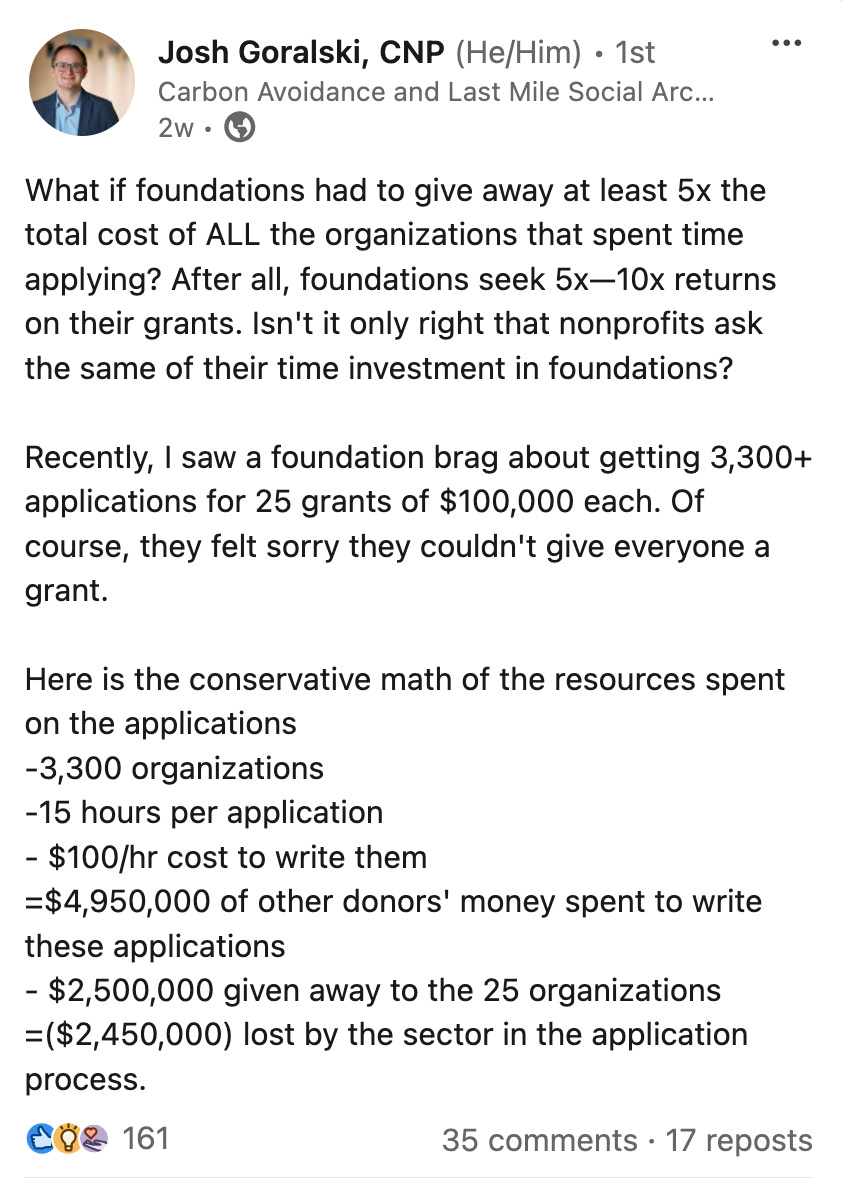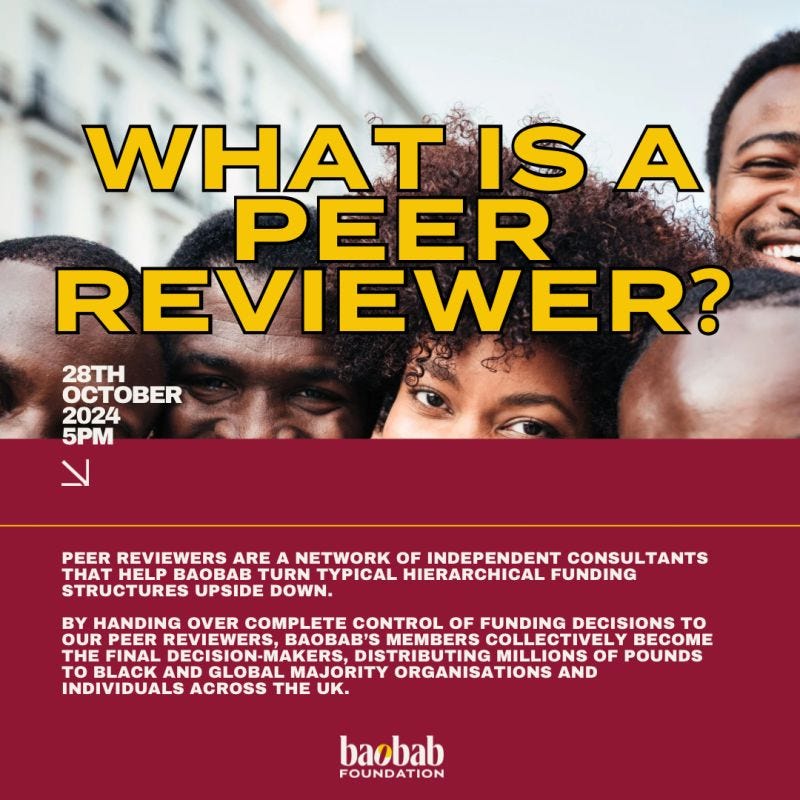Application Apocalypse!
Competition, carnage, and applicationageddon hit UK nonprofits. What are we doing about it? Apart from, you know, panicking.
Application Apocalypse
As UK grantmakers are overwhelmed with applications, there is some deep concern both from those who are making the applications (basically throwing sh*t against a wall and hoping it will stick at this stage), and from grantmakers themselves who are struggling to get through the door in the morning for all the Jim’ll Fix It letters they’re receiving. (I told you I was old; that reference tells you just how old).
I’ve been asking around. The smallest grantmakers aren’t seeing much of an increase in applications - I think they will be hit much less hard because nobody needs a £3k grant any more than they did before. The medium sized ones are seeing a substantial increase, and expecting that they will start to be hit by even greater demand. The largest ones, who aren’t closed - I don’t know. But I was extremely tickled by this meme on Linkedin.
Behind the scenes - it’s always behind the scenes - grantmakers are meeting in the very highest rooms of our ivory towers to discuss this, while the peasants at the gate are revolting (remember to shower, folks). There are many funder meetings slowly - always so slowly - happening to discuss how to deal with these pressures, and while they are always dressed in the rather sanguine language of best practice and reflection, I know people feel it quite deeply. In the grantee world, some are now mobilising and getting active, with some truly mission-driven fundraisers and charity consultants (there are now even more charity consultants than there are grant applications) starting to stir things up a bit.
Some grantmakers aren’t too worried by the criticism exactly (and it’s not even clear that they are seeing the kerfuffle), but many of them, who I’m meeting all the time, feel exactly the same about closures, and the current and growing mess as the sector contracts, as the grantees do. They are overwhelmingly sympathetic, or at least, the ones willing to talk to me are. (I think they call this self-selection…) On the other hand, I‘ve seen a couple of instances of rather nasty responses to some of the most outspoken people from infrastructure organisation big-wigs, who seem if anything rather upset that the plebs are rising up on their own account, and not going through the proper channels - ie. them. You really see how unwilling infrastructure organisations are to actually challenge anything in the sector when it has anything to do with funders, because, let’s face it, they need the cash and have positioned themselves as the ‘reasonable ones’ between the angry peasants and the castle door.
I think it’s quite right that some people are starting to get a bit activist. The reflecting on power that grantmakers do can have a very lazy, self-directed quality. A bit of fire, and demand, and push from outside (the odd pitchfork and burning torch) can focus the mind. As long as we all PLEASE remember to keep it respectful, and that the people doing this stuff on both sides truly are trying to make the world a better place. Every time anyone says ‘Funders’ and then makes a statement about their failings, I often, yes, probably agree, but also think that the sheep and goats schtick is deeply unhelpful. The system we are in is the problem - not just in philanthropy/ charity, but in essentially a neoliberal post-industrial capitalist society driven almost entirely by finance and profit.
As for ‘best practice’ in how grantmakers make decisions when they are overwhelmed, honestly I’m not sure what to say, and will be interested to find out more. Dealing with AI (which I understand has had an impact) is one thing, and training people not to produce crap which overwhelms is at least part of the answer to that one. And in terms of making decisions, I have to say, focusing on the medium sized local organisations of long standing is key - they are the bedrock, and it’s not just me who says this, all the research does too. When they go, they can’t be replaced. Supporting Big Society start-ups, or highly specialist infrastucture stuff, wouldn’t be top of my list TBH.
One more thing to note is that, realistically, the drive to increase accessibility, and reduce the complexity of application processes may well explain part of the effect. At least one of the closed funders had recently rejigged its application process to make it hugely simpler - did that have an effect? Access for all is what we have demanded, and indeed, it is the right thing to do. But what this does mean practically, in a competitive (and increasingly digital) environment? This calls for creative thinking in the short-term.
On Competition
With applications piling up, some of my conversations with funders, and fundees, have been about competition. Groaning mailbags (sorry, inboxes, and Flexigrant databases) are that part of the wider neo-liberal capitalist equation. There was a great post on Linkedin from Josh Goralski, CEO of Unlocking Communities in the US which set out one of the key problems:
I find this really interesting. What I take away from it again is not that 'funders don't get it/ care' - because they/we do. What I take away again is that at the route of all this is the sheer cost of marketisation of care through competition. Lamplight founder Matt Parker tipped me off that this has also been a problem for Local Authorities who have spent £27m on bidding for paltry Levelling Up funds.
The costs are not just financial of course. They prevent collaboration. I was chatting to a funder CEO the other day (an ex-delivery person - so we both ‘get it’), and we had this amusing moment where we were talking about how some commissioners and funders have suggested giving money to groups of delivery organisations to make decisions as to where they spend the money, and on whose service. We shook our heads sadly as the ghosts of never-forgotten wars played across the shine of our eyes. Of consortium partners grappling in the mud, napalm, bombs, screaming, forests burning, and the biggest charity standing triumphantly with the macerated corpses of its ‘partners’ in its jaws and an arm full of money for its marketing team. The first word we both used was ‘carnage’. In that kind of situation, no doubt somebody will have told the participants it is to encourage more ‘collaboration’.
But people tend not to collaborate when they don’t have enough, and don’t feel safe - and indeed, when everything they are told by their society is that ‘winner takes all’. It’s basically Threads the minute a funder says co-production.
This is a problem of our society, and the structures we apply on to every problem or need - not a problem with philanthropy alone. A competition approach is always assumed to be efficient - and yet, at a societal level, we are not considering the sheer cost of competition itself (financial as well as social). That is a problem which goes to the root of how we organise our society, our culture, and most of all our socio-political/ economic system.
Even worse, without an ability to cooperate and collaborate, but only to compete, we also lose our capacity to lead. How can there be leadership in civil society when all we have is competition? I can’t help feeling this might be quite beneficial to some.
Nonprofit Futurism?
I’ve also been reflecting hard this week on how broken it all is. Haven’t we all? But let’s be clear - I’m not suggesting it’s ‘broken’ in the sense that at one point it worked. More and more I'm finding myself going back to the fundamental critique of those structures, and wondering how civil society has found itself used as a fig-leaf for (and indeed, has not been blameless in ushering in) marketisation and financialiation of, at least, the ‘care’ aspects, of what has been called 'social reproduction' - all the stuff we do to look after each other and keep our societies going outside of the rather limited area of economic 'production'.1
As a young wannabe AIDS activist at the age of about 22 (I was a nightmare, and I’m so sorry to my first managers) - I went into the VCS because it seemed like a place where that was being resisted. And over the last 26 years, as a significant economy has grown, and every part of the sector has developed into just a market. (I saw a figure yesterday suggesting that the ‘nonprofit industrial complex’ as it has been described is worth $1tn in the US alone.) It's allowed a lot of care and social reproduction. It's allowed resources and professional structures to develop - that’s been vital. And it has allowed the development of more people who can afford time to care for their community. Absolutely imperative. But at a certain point, when the economics hit a crunch, so does the model as we have configured it.
Like Lankelly Chase Foundation, I think the system is just not going to meet our needs. And indeed that ‘philanthropy’ itself is a concept so fundamentally idelogical that it needs completely unpicking and probably dissolving. But what will replace it?
What we need is a bit of nonprofit futurism, where we dare to think beyond the same broken social and economic models being used to manage the last part of our society trying to paper over the cracks of neoliberal economics. That goes beyond applications processes, databases, decisions about who gets funded, to how we organise our society itself.
Some posts you may have missed…
Funder Closures: The Sector Responds
There's an article by NPC's Alex Hayes about the funder closures I was discussing on here and in my Barely Civil Society post last Friday.
As (the other) Alex says (also with a beard and no hair - what is happening here?), there's a question about why the applications increased so much. AI is a possibility (you may know this is something of interest to me).
And I think the sheer number of fundraising professionals, especially in the freelance sector, who are affordable to small organisations, has actually significantly increased the capacity of small organisations to bid professionally. Of course this is exactly what people have been saying was needed for many years - levelling the playing field on fundraising. But it turns out that then means simply overwhelming numbers of applications.
Another is that some major programmes like the Big Local are coming to an end, with significant numbers seeking funds to continue their legacy projects (mostly some swings and a cafe). The ongoing battening-down of local authority hatches is another.
Other-Alex is right there's no shortage of anxiety amongst funders themselves about closure, and that this is not a decision anyone is taking lightly. I also know that within the funder landscape there is a significant divergence of feeling developing about closures, with many smaller funders concerned that the closure of the largest leaves them exposed, underpowered, and in some ways left hanging.
I also think it's interesting that Fake-Alex rightly reminds us that T&F only represent 10% of charity income. And that belies a very significant textural difference - charities between £500k and £1m, often local, and with ever diminishing local authority funding over the years, have become crazily reliant on those trusts. Without a Henry Smith worker, a core grant from City Bridge, a bit of unrestricted from Garfield Weston, and a National Lottery project for three years with a couple of years off inbetween, those kind of things can't survive - because they have no money for actually solid professional positions. Those are the kind of funds that can buy you substantive posts. And without that, you are absolutely b*ggered, and back to being almost entirely non-professionalised community organisations.
You can romanticise ad-hoc semi-professional community organisations, but it was the slightly bigger professionalised ones with the solidity that got people through COVID - quite literally. And indeed those are the ones that Lloyds Bank Foundation for England and Wales research showed were 'small but vital' - for resilience, stability, continuity. There's a whole slice of the market about to go. And the voluntary sector is about to get a whole lot more voluntary.
The Baobob foundation - peer reviewers
I’m really interested in what the Baobab Foundation are doing in their decision-making. Very interesting indeed as a model, with more of that breaking down barriers between 'funder and funded', which needs to happen. If there’s a way of dropping the pitchforks.
“Our Peer Reviewers are what make Baobab different from other funders. Our Peer Reviewer network operate independently from us and formed from our members, represent community decision-making in action by having the final say on which Black and Global Majority organisations and individuals will be funded by our grants.
Join us in turning funding structures upside down through communal decision-making!”
And finally….. Salford Lads Club
Some years ago, me and the CEO of a London funder spent a fortune on memorabilia in the little shop on a site visit to Salford Lad’s Club. Notebooks, pencils, all sorts. We were neither of us massive Smiths fans, but as he said ruefully ‘It’s just the mythology’. Of course, youth organisations have been smashed across the UK. Graham Nash from the Hollies has given them £10k. I bet Morrissey hasn’t.
Salford Lads Club: historic youth centre battles to keep doors open. The Guardian
Thanks
Finally, a big shout out to Jo Jeffery and Vic Hancock Fell and a few nameless funders for chatting about all this this week, and making me feel less like a crazy person. And for all the great work they are doing to keep things ‘interesting’. Solidarity!
I’ve even been hitting the critical theory and the Frankfurt school again after quite a long break. Ahh, my old friends, bonking Herbert Marcuse, Adorno and horny Horkheimer. And a bit of Habermas.







